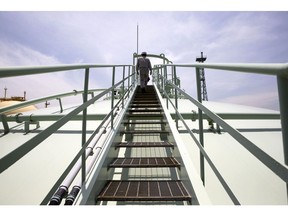Qatar is seeking more gas deals in Europe and Asia in a bet demand will continue to grow as it embarks on a new multibillion-dollar project to expand exports.
Bloomberg News
Verity Ratcliffe
Published Feb 26, 2024 •
Join the conversation

An LNG terminal in Japan.
PHOTO BY TOMOHIRO OHSUMI /Bloomberg
(Bloomberg) — Qatar is seeking more gas deals in Europe and Asia in a bet demand will continue to grow as it embarks on a new multibillion-dollar project to expand exports.
The Middle Eastern nation — already one of the world’s largest suppliers of LNG — plans a new 13% increase in annual capacity on top of a previously announced expansion. Population growth, particularly in Asia, will drive demand along with an economic recovery across the world, Qatar’s Energy Minister Saad Al-Kaabi said. The country is also looking to lock in more contracts in Europe, he said.
The decision to plow yet more investment into gas production comes as an outlook for a supply glut and a shift by some countries away from fossil fuels threatens projects elsewhere. Global gas demand could peak by the end of this decade, according to some analysts, including the International Energy Agency.
(Bloomberg) — Qatar is seeking more gas deals in Europe and Asia in a bet demand will continue to grow as it embarks on a new multibillion-dollar project to expand exports.
The Middle Eastern nation — already one of the world’s largest suppliers of LNG — plans a new 13% increase in annual capacity on top of a previously announced expansion. Population growth, particularly in Asia, will drive demand along with an economic recovery across the world, Qatar’s Energy Minister Saad Al-Kaabi said. The country is also looking to lock in more contracts in Europe, he said.
The decision to plow yet more investment into gas production comes as an outlook for a supply glut and a shift by some countries away from fossil fuels threatens projects elsewhere. Global gas demand could peak by the end of this decade, according to some analysts, including the International Energy Agency.
Qatar’s push highlights the importance of gas for the country. Exports of the fuel are the country’s biggest revenue earner which has already made it one of the wealthiest countries and helped boost its global clout since it started shipments about two decades ago.
“We’ve been consistently saying that we need a lot of LNG,” Al-Kaabi said in an interview on Sunday. “We need more gas for the world, and we need more players.”
Qatar will add 16 million tons of annual production capacity before the end of this decade, in addition to a 49 million tons-per-year expansion that’s already underway. It has signed a 27-year pact with China Petroleum & Chemical Corp. and with European companies such as Eni SpA, TotalEnergies SE and Shell Plc. Still, BloombergNEF data show the country needs to find buyers for supply from about half of the ongoing expansion.
US Pause
The move also comes just as the US, the world’s biggest LNG producer last year, has paused issuing new export licenses while it considers the impact of higher exports on the climate, the economy and national security.
That decision will hit small American producers that rely on securing long-term sales agreements to underpin investments in liquefaction projects, according to Al-Kaabi.
“Buyers will not go for these sellers if every day the government could stop the process,” he said. “It’s very difficult to have long-term planning when you have that.”
Natural gas prices have slumped in recent months, in part due to mild weather and muted demand, but also because Europe’s energy crisis has faded and new LNG production facilities are expected to ease any residual market tightness.
While it’s counterintuitive for Qatar to expand in a potentially “oversupplied market, we believe the region, which is the lowest-cost LNG supplier in the world, can benefit from increased long-term market share while conveying the image of a reliable supplier,” Goldman Sachs Group Inc. said in a note.
The expansion follows discoveries of more gas in the North Field. If Qatar’s North Field West starts up in 2030, Qatar will have a 23% share of global LNG production by 2033, assuming global demand for the fuel remains unchanged, said Fraser Carson, senior research analyst for global LNG at Wood Mackenzie Ltd.
Qatar is insulated from the full impact of global price swings, Al-Kaabi said. “If there’s a downturn, we will be able to cope with it more than others.”
—With assistance from Fiona MacDonald, Stephen Stapczynski and Anna Shiryaevskaya.
(Updates with WoodMac estimates for Qatar’s share in penultimate paragraph.)
No comments:
Post a Comment